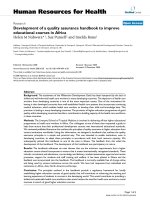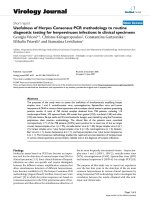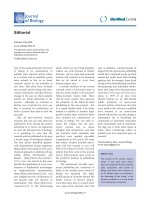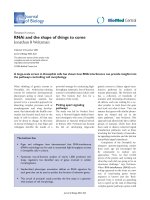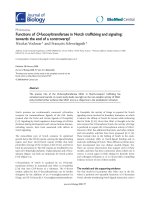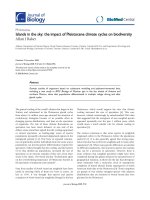Báo cáo sinh học: "One of the unusual features of Journal of Biology is its commitment to publish each research article online as" pdf
Bạn đang xem bản rút gọn của tài liệu. Xem và tải ngay bản đầy đủ của tài liệu tại đây (37.29 KB, 1 trang )
One of the unusual features of Journal
of Biology is its commitment to
publish each research article online
as it is ready, and to assemble a print
issue around as few or as many
research articles as are available at
one time. This print issue includes
two research articles along with asso-
ciated commentary, and this reflects a
change in the pace at which suitable
articles are being submitted to the
journal - although we continue to
decline tens of articles for every one
that is accepted for publication, as
befits a journal that aims to join the
top rank.
Like all peer-reviewed research
journals, this one can only select for
publication from among the articles
submitted to it. Given our aspiration
to cover the full spectrum of biology,
it is gratifying to note that the
research articles published so far span
a broad range of biological subjects.
The first articles described genome-
wide characteristics of gene expression
( and a
chemical approach to studying cell sig-
naling during development and
disease ( />2/10). Now, the articles in this issue
describe the application of a new com-
bination of biophysicial technologies
to single-molecule measurements
( and
new insights into the coordination of
cell growth with cell division in
mammalian cells ( />content/2/1/7). In the forthcoming
issues, which are now being prepared,
readers can look forward to further
diversity, and we hope that potential
authors will continue to be reassured
that we do intend to cover their
favorite subject area.
A notable attribute of the second
research article in this print issue is
that the senior author is the journal’s
Editor-in-Chief, Martin Raff. There
will be some readers who question
the propriety of the Editor-in-Chief
publishing in ‘his own journal’ - but
in a classic double bind, if he chose
instead to publish in another high-
profile journal there would be those
who doubted his commitment to
Journal of Biology. We can only re-
assure the sceptics that the peer-
review process was, as usual,
stringent and anonymous, and that
the journal’s usual standards and
practices were applied especially
scrupulously to this article. We hope
that others, whether formally associ-
ated with this journal or not, will
follow the Editor-in-Chief’s lead and
submit their best work to this journal
and so help promote open access as
the preferred method of publishing
in biology.
The momentum towards open-
access publishing has continued to
build in the months since Journal of
Biology was launched. The high-
profile group of scientists behind the
Public Library of Science (http://
www.plos.org/) plan to launch their
own open-access journals later this
year. In addition, announcements of
support for the open-access publishing
model have continued to pile up from
around the world, from both funding
agencies (see, for example, those listed
at />about/apcfaq) and individual institu-
tions (see medcentral.
com/inst/). Ever since the first circu-
lation in 1999 of an idea from
Harold Varmus for an NIH-funded
public repository of open-access
research articles, it has been clear that
every author who chooses to publish
their research in an open-access
journal rather than one that charges a
subscription fee is benefiting the
community of interested researchers
both immediately and in perpetuity.
We urge you to bear these issues in
mind when considering where to
publish your next important piece of
research.
Theodora Bloom, Editor, Journal of Biology
E-mail:
BioMed Central
Journal
of Biology
Editorial
Published: 2 May 2003
Journal of Biology 2003, 2:1
The electronic version of this article is the
complete one and can be found online at
/>© 2003 BioMed Central Ltd
Journal of Biology 2003, 2:1
Editor’s note
The authors of the second research
article in this print issue (http://
jbiol.com/content/2/1/7) have both had
close associations with Journal of
Biology, and Martin Raff continues to
do so. Neither author was involved in
the refereeing of this article, in the
decision to publish it, or in the choice
of accompanying commentary.
